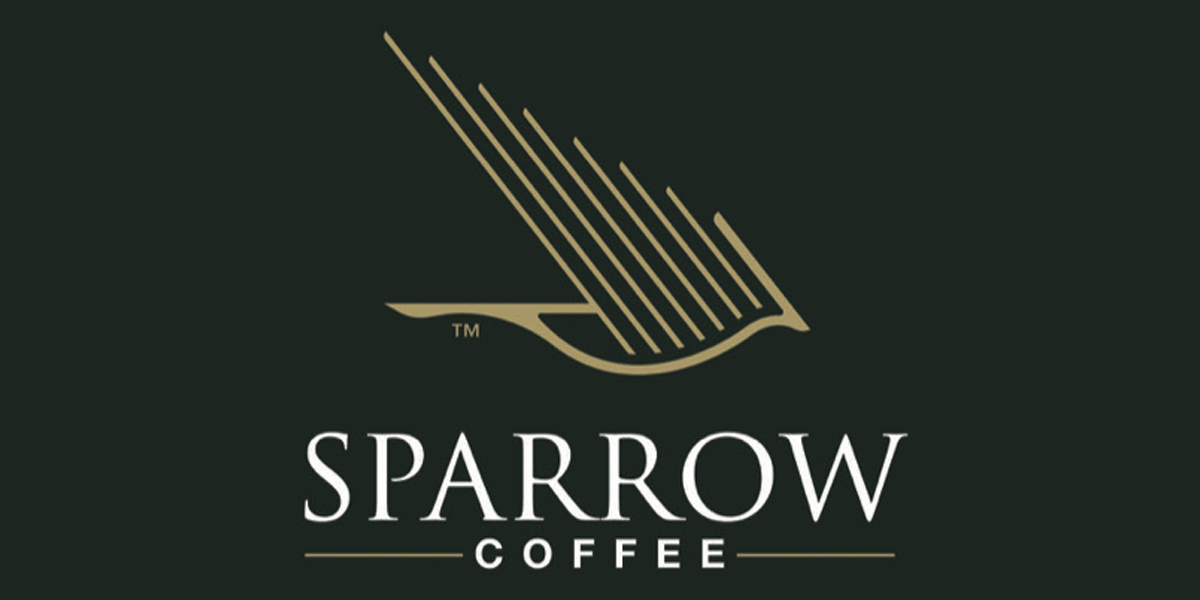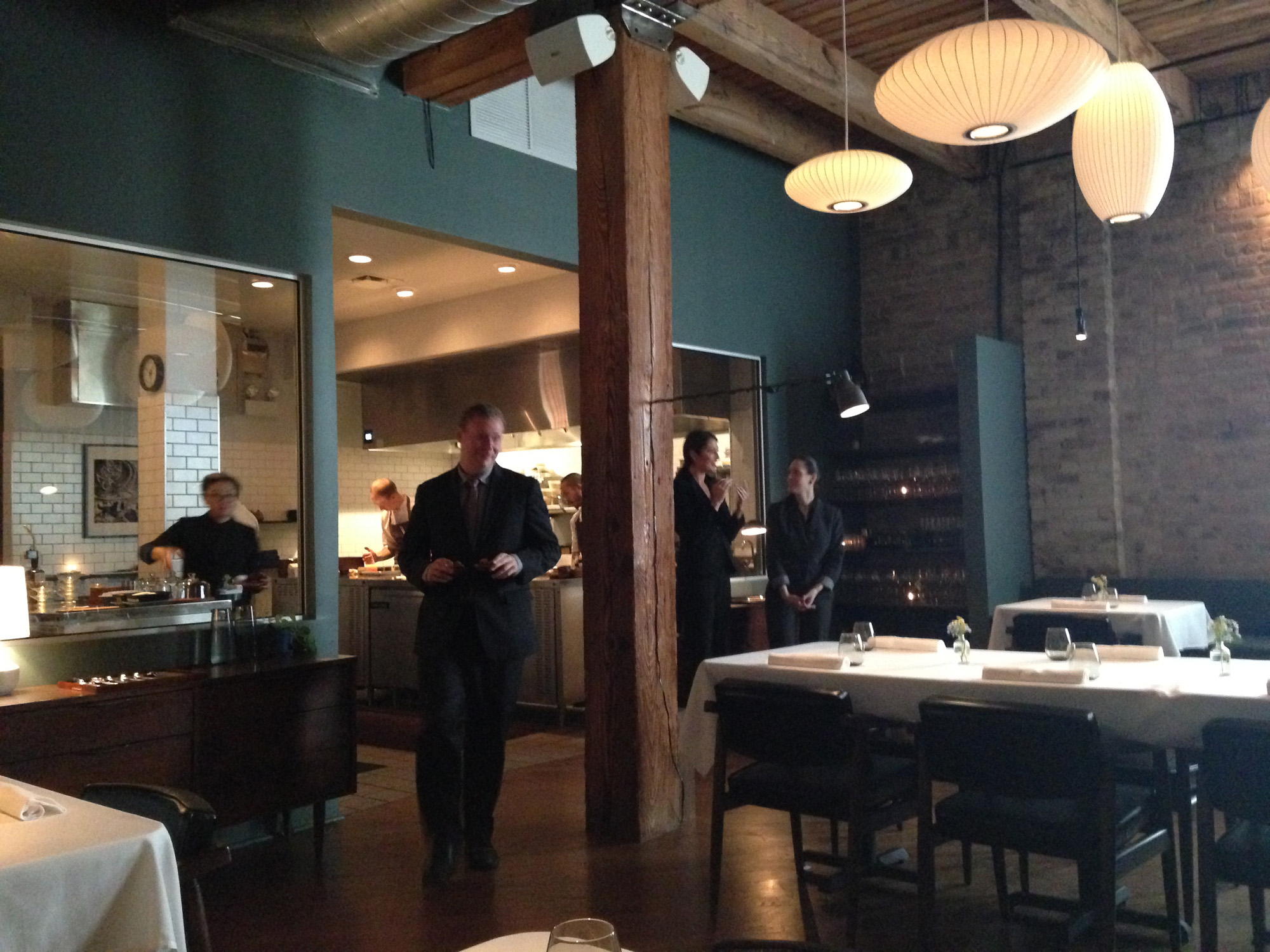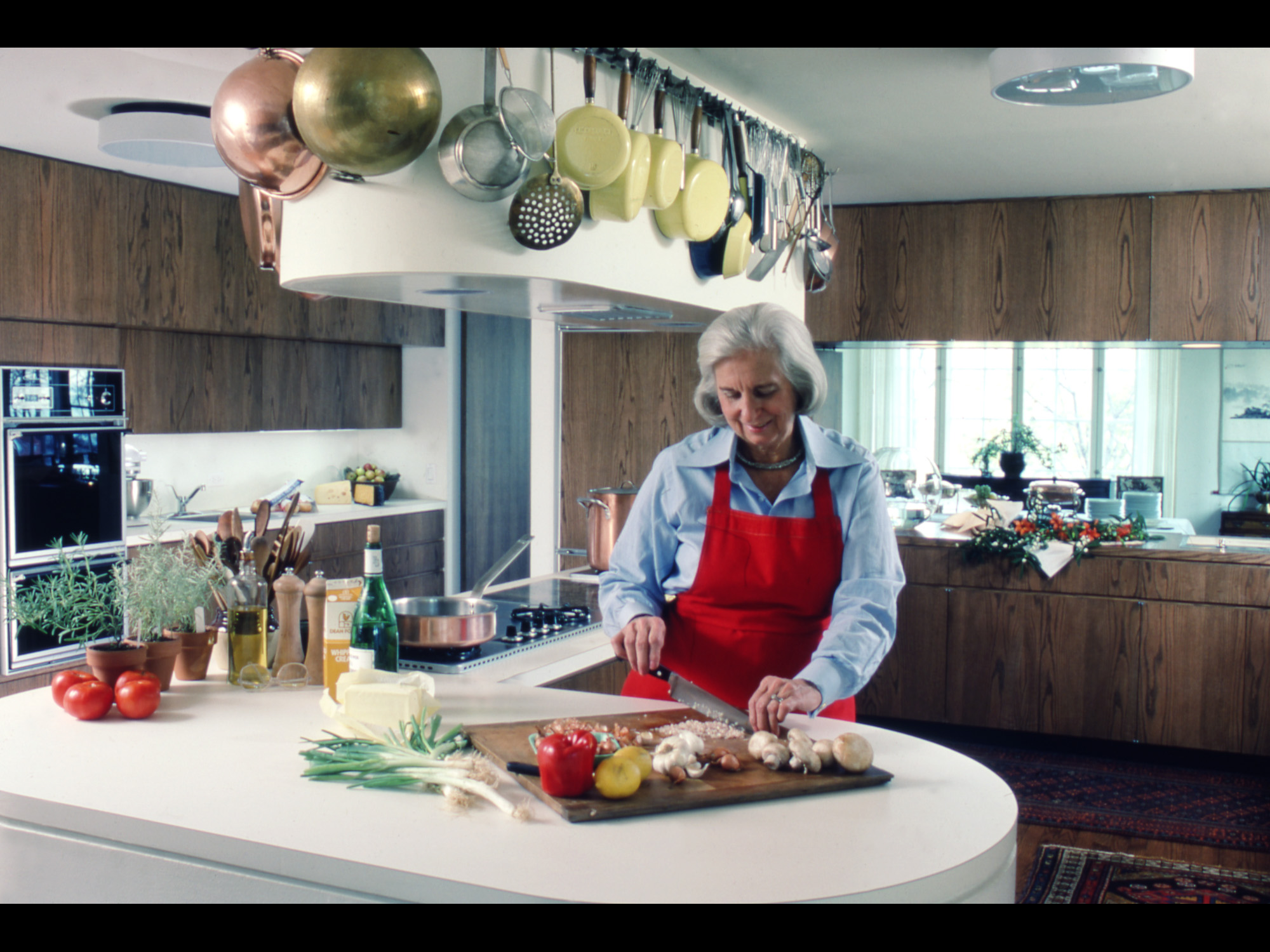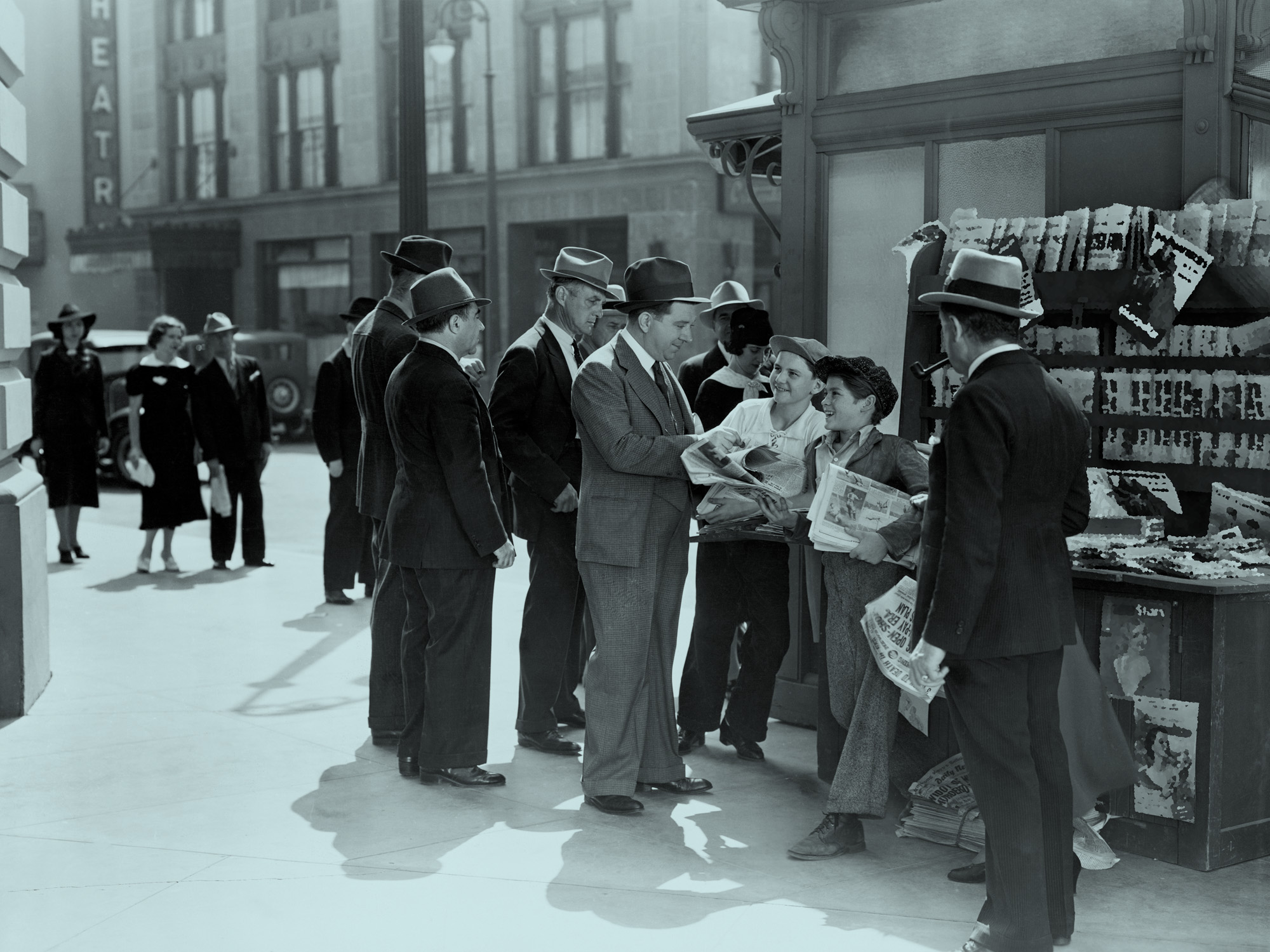A COUPLE OF HUNDRED PEOPLE ARE MILLING about a restaurant in Chicago, enjoying appetizers and cocktails, and at first you’re just one of them, greeting chefs you know and meeting writers you’ve only talked to on social media. But then something happens: you’re culled from the herd. There’s a stand at the front of the room and you’re led to it, alone, clutching the papers that are your plea for clemency. The room grows quiet; they’re all looking at you. You lean into the microphone, and begin your desperate attempt to stave off grotesque public humiliation: “The name of my story is ‘The Squeezonk of Tolerance.'”
That was me at Homestead in July 2014, but the same experience more or less has been shared to date by about 50 figures from the world of Chicago food including writers, TV producers, restaurant owners and chefs, at a dozen different venues. They’ve all volunteered to read a story at Between Bites, a quarterly series of “live lit” readings focused on food and food culture, however the writer chooses to portray it.
Between Bites was started by three women in food journalism—Molly Each, a freelance writer (Lucky Peach) and editor (the Sun-Times) who was already involved with live lit in Chicago as part of the group Second Story; Liz Grossman, who is managing editor of Plate magazine; and Rachel Gillman Rischall, who is now director of marketing and communications for the Hogsalt restaurant group. Besides giving so many people an opportunity to show another side of themselves in public, the events have raised over $25,000 for local charities such as Un-86d and the Greater Chicago Food Depository. So not only has it been successful, they’re looking to expand—they plan to finally launch a podcast with the stories, to share them more broadly, and they’re working on doing a show in New York.
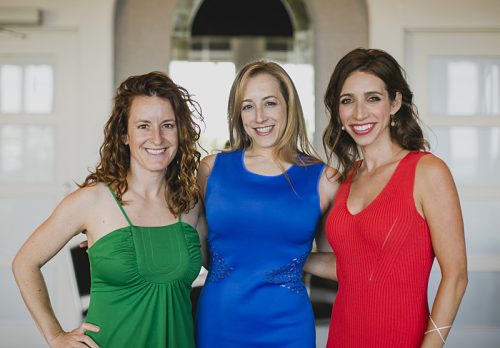 Rebecca Peplinski
Rebecca Peplinski Molly Each, Liz Grossman and Rachel Gillman Rischall
Their next event, November 15 at The Betty (get tickets here), will mark their third anniversary, with readers including Billy Lawless, owner of The Dawson and The Gage, chef Ryan McCaskey of Acadia, the Tribune’s Joseph Hernandez, and Penny Pollack of Chicago magazine (who, fittingly for a public appearance, will talk about why the publication has dropped anonymity for its reviewers). The theme will be “food fight.” I sat down with them while Rischall’s twins napped to talk about three years of telling stories.
How did Between Bites begin?
RISCHALL: About four years ago, Liz, Molly and I went out to dinner, and we started talking about Molly’s involvement in live storytelling and just how interesting it was, that she was part of this community. And it spurred a brainstorm, a very impromptu brainstorm, that we have amazing writing talent in Chicago, we have this very strong culinary community, but you often feel like you don’t get personal anecdotes from the writers in Chicago. They’ll write reviews, they’ll write roundups, but they’re really not diving into their personal stories and narratives.
GROSSMAN: We were talking about all the live lit there is in Chicago and saying, there really is nothing that’s like a food writing, a food story platform.
RISCHALL: We thought, what if we provided that platform, what if we gave people an opportunity to tell their really personal stories and we could feed people and entertain them and provide drinks, and in the process, support a meaningful local charity.
The name literally came from that moment when you’re talking between bites. So we worked with Two as the first venue and we rounded up some readers and lo and behold, it worked.
EACH: I went to school for creative writing and while I was there I got connected with Second Story, a live lit performance series. It’s less like going up with [unedited] pages and more like a crafted night. I’ve been involved with that for over 12 years, I was a company member there, so I had a lot of experience with what makes a good night, what makes a good journey for an audience member. What makes a good reading? What makes a bad reading, because reading something on a page and reading something out loud is totally different.
So what makes a good night?
EACH: It’s a good mix of voices, it’s a good mix of points of view. So we really try to put together a reading where it’s different backgrounds—it’s not six chefs. It’s a couple of writers, it’s a couple of chefs, it’s a couple of food professionals. We try to do a newer chef and a more established chef.
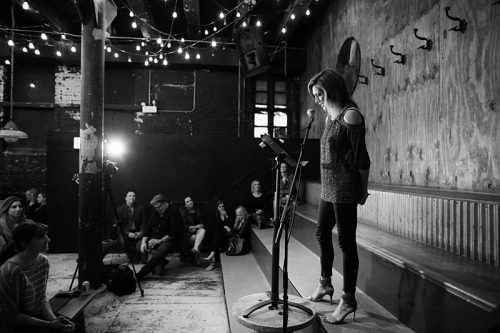 Zachary James Johnston
Zachary James Johnston Culinary garden designer Sara Gasbarra at Green Street Smoked Meats, October 2015
We work hard on our themes. A broad theme, so like, “food fight.” And we really encourage, take that anywhere you want to go. And then all the writers send their topics back, and we’ll look over the stories and offer feedback. Some people are procrastinators—I mean, I won’t write mine until the night before.
RISCHALL: In terms of the themes, we really liked how we started with “food firsts.” People went all over the map, from their first fine dining experience, to their first time staging at Charlie Trotter’s, to their first food romance—people really went in interesting directions about how they fell in love with food or how they were introduced to the food world.
We really love the juxtaposition of themes—we’ve done “love/loathe,” “hot/cold,” “inside/outside.” People can go in a direction where it incorporates both of the extremes, or they can just write about one of them.
Or sometimes we’ll give them a really unique direction like “The Witching Hour,” and Kevin Boehm told an amazing story about how the Witching Hour played out for him at different points in his career. So, working in the deep south, the panhandle of Florida, and how there was this witching hour in the restaurants, where things got weird.
We’ve never had anybody, out of more than 50 readers, walk away and say anything other than, I’m so glad I did that.
GROSSMAN: But what’s cool is that everybody takes it in a different direction.
RISCHALL: Did we do “food porn?”
GROSSMAN: Yeah, and Steve Dolinsky had music, “boom chicka boom boom”—(laughs)
EACH: Then we’ll look at the topics—this one sounds a little bit funny, we’ll put it here, this one’s sad, like Ina [Pinkney]’s story about her dad dying, that can’t really open or close the night, because you don’t want to start the night on a sad note, or leave people with, what a downer.
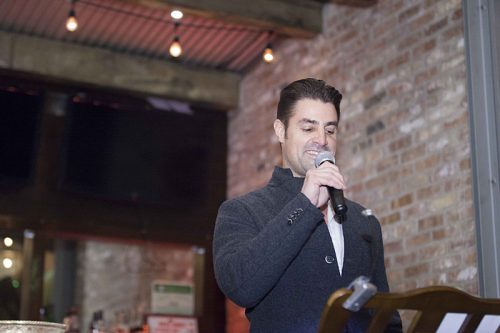 Zachary James Johnston
Zachary James Johnston Kevin Boehm at Frontier, October 2014
So, putting them in the right place to keep the energy going, and having everybody leave on a really excited note.
GROSSMAN: And I also think because every event has been a completely different venue, different theme, different roundup, we pay a lot of attention to the setting, and we try to create that more intimate reading series vibe, kind of the perfect mix of not too crowded, but still comfortable. I think by now we can kind of walk into a space and envision, okay, it can happen here.
The writers I think tend to be pretty easy in front of the microphone—we’re hams. But chefs, not necessarily—have you dealt with anyone who was terrified to be up there?
EACH: We’ve only found out after the event how nervous a chef was. But we’ve gotten the feedback that—chefs are so used to appearances, and going on TV, but when it’s their own writing, and reading off of a page, that it’s a totally different experience. A couple of them have been like, “I had to have a lot of drinks to get up there.” They’re used to being in front of a crowd but it’s a totally different experience, reading the crowd reaction and all that.
I’m used to being professional about something that doesn’t touch me, but reading my own story I was aware of the possibility that people might not like something in it—
GROSSMAN: Judge it—
EACH: Or a line doesn’t land, that you thought was going to get laughs.
GROSSMAN: It’s definitely personal. One of the chefs we got feedback from was Kevin Hickey, who said, I make TV appearances, we do all this stuff in front of everybody, but this is the scariest thing—and then he’s like, when can I do it again?
RISCHALL: I think there’s something thrilling about how vulnerable you get to be. And also, whether you’re a writer or you’re a chef, you’re used to interacting with people, but it’s very different when you’re standing in front of a hundred people reading something that’s very personal, and you want them to love it and you want to have a great interplay with the audience.
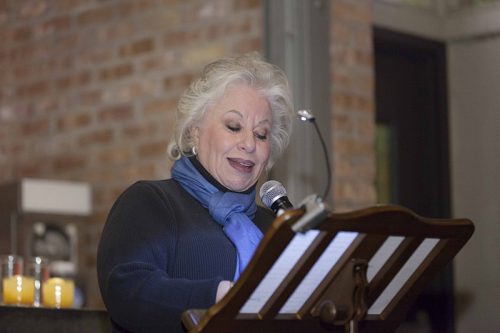 Zachary James Johnston
Zachary James Johnston Ina Pinkney at Frontier, October 2014
Fortunately, we’ve never had anybody, out of more than 50 readers, walk away and say anything other than, I’m so glad I did that.
EACH: And our crowds are so incredible—like, the people who come out, they are so ready to listen, they’re hanging on every word, nobody‘s on their phone, everybody is so tuned in and so happy to be listening to Kevin Boehm talk, or Kevin Hickey, or Ina.
GROSSMAN: I think what’s also cool is that with these chefs who haven’t had a chance to do this before, maybe they’ve never done it—Jason Hammel read at Formento’s, and he said, this is the first piece I’ve written in years, and Christine Cikowski was like, this is the kind of writing that I want to do, but I’ve never had a platform for this.
Well, I know I’ve told Molly this, but one of the things that made me want to do Fooditor was going to one of the early ones, at The Dawson, and there were people reading who I only knew by their bylines and 150 word assignments. And I saw how much more thoughtful and sharp they were given the chance, and how much more they had to say, and I too thought, there needs to be a platform in the Chicago food media scene for people to be able to write more and say more.
EACH: I think we all want to push the limits of 50-word blurbs and 200-word reviews. All the publications have such a specific form and there’s no stretching that. But what you’re doing and what we’re trying to do is just, like… blow it up a little bit, you know?
RISCHALL: I think the other part of it that has really grown nicely, too, is the charity component. In the process we’ve been able to make meaningful contributions. It feels really nice that we’re marrying the storytelling and a positive connection to giving back.
How does that work? Is it a different charity for every event?
RISCHALL: We have a couple of preferred partners, but the restaurants that host us have the ability to choose a non-profit that’s most meaningful to them. Un-86’d [which benefits industry professionals in need] has come up a lot with our partner restaurants, and the Greater Chicago Food Depository has come up a lot as well, along with a couple of other charities.
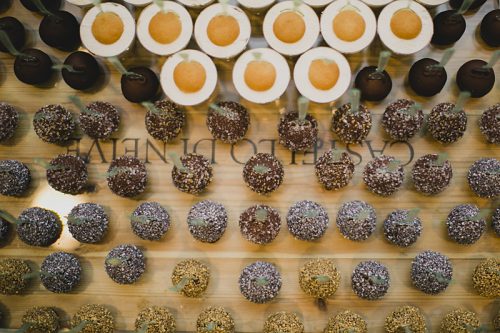 Rebecca Peplinski
Rebecca Peplinski Desserts by Bake Me Off at a recent event
GROSSMAN: The restaurants are really excited because it’s a way for them to give back, because they provide all that food and labor. Usually they have somebody in mind. And we’ll invite the charity to come and speak at the break, if they like. The Greater Chicago Food Depository was the charity for the last one at Spiaggia, so we collected food items at the event.
So once in a while it seems like there’s a story that’s not a story, it’s just, My Fabulous Life as a Food Writer or whatever. What can you do if you know a dud story is coming?
EACH: That’s the risk of not demanding that we see the story beforehand. Which is such a challenge because I feel that if we did demand that, we would get less people participating. Because that’s a big ask, like, write a story, we’re going to give you feedback, you have to give us a revision.
We try to put together a lineup that is as much about people’s energies as it is about a story, so that if we’re a little uncertain about a story, it’s going in a place where there’s a balance. And we try to go up between readers, get the energy back up, if we need to.
GROSSMAN: A lot of times with a chef, it won’t be a story so much as Why I Became a Chef, about the passion behind their career. So if we get a chance to see the story ahead of time, a lot of the feedback we give them will be like, how did you feel, more personal stuff. And I think they don’t think anyone will be interested in that, they basically want to tell their resume. And we ask them, what are some really interesting anecdotes along the way.
EACH: The story matters, but at the same time, people are just so excited to be in the same room with some of these people. Like with Brendan Sodikoff, they were like, “Oh my God, I’ve never seen him in person before, I can’t believe I’m going to hear him talk. I didn’t even know what he looked like.”
RISCHALL: While we know that what we see ahead of time is helpful, it really depends on the personality. I didn’t know Cleetus Friedman very well before he read, and he didn’t show us much ahead of time, but he got up there and he was just so easy-going and he was really warm and engaging and fun and irreverent. And it worked, because he worked.
I didn’t know Jason Hammel very well either, but he got up there and he blew me away. I think he is a poetic and a lyrical writer, and his delivery had me crying at Formento’s. And I looked around and there were a lot of people crying, and I think that’s also a weirdly bonding and cathartic experience, to be in a room with strangers and to be so immersed in it that you’re crying together and laughing together.
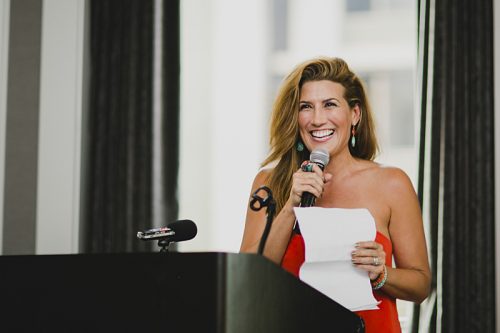 Rebecca Peplinski
Rebecca Peplinski Check, Please! host Cat De Orio at Spiaggia, July 2016
GROSSMAN: That’s the beauty of a live audience—somebody who’s maybe never read before gets up there, and suddenly they’re getting feedback and they’re finding that connection, and then you might find them improvising a little bit more. I think Jimmy Bannos kind of did that at Spiaggia, and he was like, “No, really, seriously!” He kept going on and on and he brought it to life, because you get that interaction.
RISCHALL: We’d wanted to get [Check, Please! producer] David Manilow to read for a long time, and he had this particular story that he wanted to do. David did not send us anything in advance, he said, I’m just going to tell this story. And we had such a moment of panic, because everybody reads. Everybody brings up multiple sheets of paper.
EACH: We’re very specific, it should be between three and four pages, Times New Roman font, so people don’t get up and read for 20 minutes.
RISCHALL: And we love David, and we trust David, but it made us very nervous. And then he got up there, and he killed. He told the story like a comedian, and it was really a a fantastic performance, and it shifted our mindset about whether or not people really need to read a story, or if they can tell a story.
EACH: It makes me break out in a sweat, though, because I’m just like, please abide by the time. Nothing kills a reading faster than somebody just going on, and on, and on. If you want me to time it, give you signals, whatever, but we have to drill that in—8 minutes.
I’d be afraid to wing the whole thing. I’m a writer, I need to have paper in my hand.
RISCHALL: Paper makes us more comfortable, too. Paper calms our nerves.
So why do you think this has been successful? Why do people want to go hear these stories?
GROSSMAN: I think there’s a really active Live Lit community in Chicago, and we’ve been listed on a lot of event calendars, so a lot of people have just found it and not known anyone, but they found it interesting.
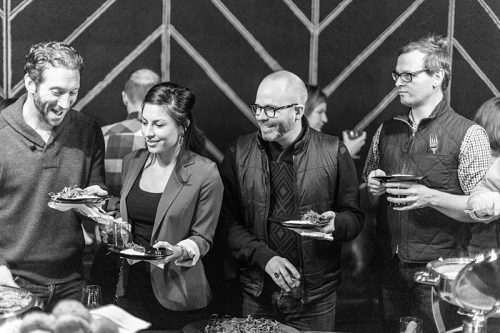 Galdones Photography
Galdones Photography Ordinary Chicagoans with no connection to the food industry enjoying themselves at an event
RISCHALL: It’s entertainment and it’s access to the chefs and people in the food media, and a chance to see a cool venue.
What blows our minds now is that we have these events and we don’t know most of the people there. It’s stopped being, we lean on our friends and our families—
EACH: And a bunch of PR people—
RISCHALL: “Please come, it’s going to be awesome!”
No, it has become something with a life of its own. And we’ll stand up there and look out on a sea of people and we’ll think, I might only know four or five people that are not the readers. And that’s actually the best feeling of all.
Want to hear a story from Between Bites?
In a preview of their upcoming podcast, Between Bites shares this story from their July 2016 event at Spiaggia, in which Christine Cikowski tells a story about how she arrived at co-creating Honey Butter Fried Chicken.
As Michael Gebert awoke from uneasy dreams he found himself transformed into an editor.
COVER PHOTO: Tony Mantuano at GreenRiver, March 2016 (Kendall Karmanian)
Latest
Join the Discussion
After you comment, click Post. If you're not already logged in you will be asked to log in or register with Disqus.




